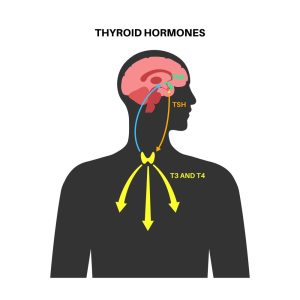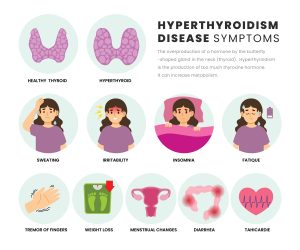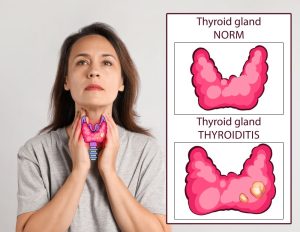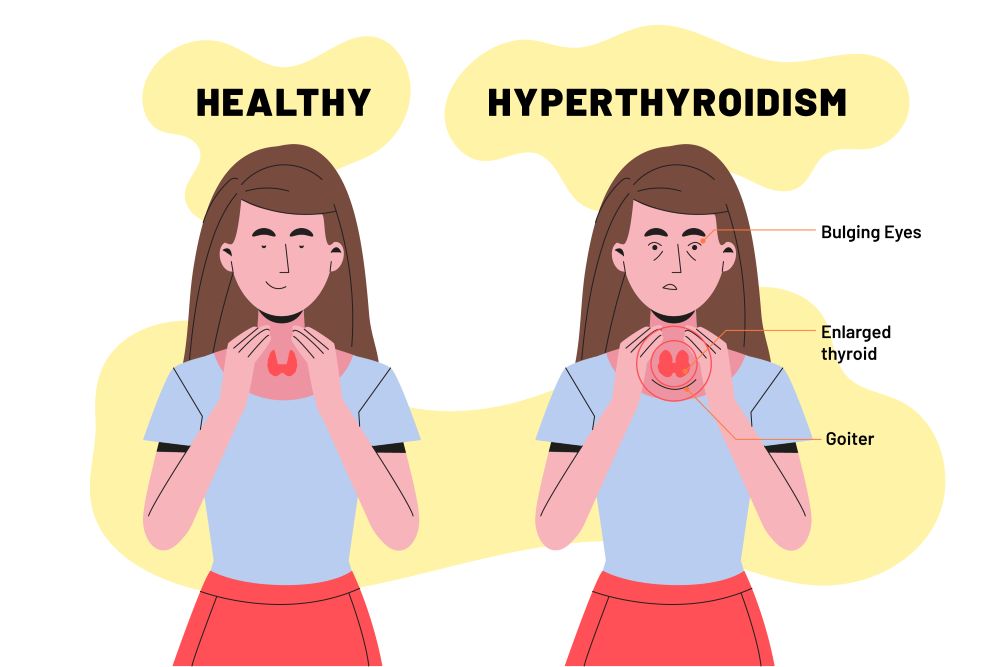The human body depends on the thyroid gland, a small butterfly-shaped organ located at the base of the neck, to regulate metabolism and energy production. When the thyroid becomes overactive and produces too much of the hormone thyroxine (T4) and triiodothyronine (T3), the condition is known as hyperthyroidism. This imbalance can speed up the body’s metabolism, leading to various physical and emotional changes.
Understanding hyperthyroidism symptoms, identifying hyperthyroidism causes, and knowing the available hyperthyroidism treatments is crucial for managing this condition effectively.
What is Hyperthyroidism?
Hyperthyroidism occurs when the thyroid gland produces excess thyroid hormones. These hormones are responsible for controlling the speed of many body processes, including how fast the heart beats, how the digestive system functions, and how the body uses energy. An overactive thyroid can affect almost every organ in the body, leading to symptoms that range from mild to life-threatening if left untreated.

Hyperthyroidism Symptoms
Recognizing hyperthyroidism symptoms early can make a significant difference in seeking timely medical care. Common signs and symptoms include:
- Increased heart rate (tachycardia)
- Unexplained weight loss despite increased appetite
- Nervousness, anxiety, or irritability
- Tremors, usually in the hands and fingers
- Excessive sweating and heat intolerance
- Frequent bowel movements or diarrhea
- Fatigue and muscle weakness
- Difficulty sleeping (insomnia)
- Menstrual changes in women (lighter or less frequent periods)
- Goiter – a visibly enlarged thyroid gland in the neck
- Thinning of hair and fragile skin
- Bulging eyes (in Graves’ disease)
In some older adults, hyperthyroidism symptoms can be subtle or atypical, often mistaken for depression or heart disease.

Hyperthyroidism Causes
Several factors can contribute to the development of hyperthyroidism. Understanding these hyperthyroidism causes can help in risk management and early detection:
1. Graves’ Disease
The most common cause of hyperthyroidism is Graves’ disease, an autoimmune disorder where the immune system attacks the thyroid, causing it to produce too much hormone.
2. Thyroid Nodules
Small lumps or growths called thyroid nodules can become overactive, leading to excessive hormone production.
3. Thyroiditis
Inflammation of the thyroid gland, often due to infection or autoimmune reactions, can cause hormone leakage into the bloodstream, temporarily resulting in hyperthyroidism.
4. Excessive Iodine Intake
The thyroid uses iodine to make hormones. Excessive iodine intake through diet or medications can overstimulate the thyroid.
5. Overmedication
Sometimes, people treated for hypothyroidism (underactive thyroid) can accidentally take too much thyroid hormone replacement, leading to hyperthyroidism.

How is Hyperthyroidism Diagnosed?
Diagnosis of hyperthyroidism typically involves:
- Physical Examination: Checking for an enlarged thyroid, tremors, or rapid heartbeat.
- Blood Tests: Measuring levels of TSH (thyroid-stimulating hormone), T3, and T4 hormones.
- Radioactive Iodine Uptake Test: Evaluates how much iodine the thyroid absorbs.
- Thyroid Scan: Shows the structure and function of the thyroid.
- Ultrasound: Detects nodules or inflammation.
A combination of these tests helps the doctor determine the cause and severity of hyperthyroidism.

Hyperthyroidism Treatment
The right hyperthyroidism treatment plan depends on the severity of the condition, its cause, and the patient’s age and health. Here are the main treatment options:
1. Antithyroid Medications
Medicines are commonly prescribed. They reduce the production of thyroid hormones and are often the first line of treatment, especially in mild cases.
2. Radioactive Iodine Therapy
Radioactive iodine is taken orally and absorbed by the thyroid, where it gradually destroys the overactive thyroid cells. This method is highly effective but may lead to hypothyroidism, requiring lifelong thyroid hormone replacement.
3. Beta-Blockers
Although not directly affecting thyroid hormone levels, beta-blockers help control hyperthyroidism symptoms such as rapid heartbeat, anxiety, and tremors.
4. Surgery (Thyroidectomy)
In some cases, part or all of the thyroid gland may be surgically removed, especially if there are large goiters, cancerous nodules, or if other treatments are not feasible.
Each method has its advantages and risks. Doctors personalize hyperthyroidism treatment plans based on the patient’s condition and preferences.
Lifestyle Tips for Managing Hyperthyroidism
In addition to medical hyperthyroidism treatment, lifestyle changes can help:
- Nutrition: Avoid iodine-rich foods like seaweed and iodized salt if advised by your doctor.
- Stress Management: Practice relaxation techniques such as yoga, meditation, and breathing exercises.
- Adequate Sleep: Prioritize sleep to help the body recover and regulate hormone production.
- Exercise: Engage in moderate physical activity to strengthen muscles and maintain heart health (after medical advice).
- Regular Checkups: Keep scheduled appointments to monitor thyroid hormone levels and adjust treatment as needed.
Complications of Untreated Hyperthyroidism
If left untreated, hyperthyroidism can cause severe complications such as:
- Heart problems: Rapid heart rate, atrial fibrillation, and heart failure.
- Brittle bones (osteoporosis): Excess thyroid hormone can interfere with calcium absorption.
- Thyroid storm: A rare but life-threatening condition where symptoms worsen suddenly and severely.
- Eye problems: Particularly in Graves’ disease, leading to eye bulging, redness, and vision loss.
Timely treatment is crucial to prevent these complications.
Conclusion:
Hyperthyroidism is a manageable condition when detected early and treated appropriately. Recognizing hyperthyroidism symptoms, understanding hyperthyroidism causes, and seeking timely medical care can prevent serious health issues. With proper hyperthyroidism treatment and the right medicine for hyperthyroidism, patients can lead healthy, active lives.
If you notice signs like rapid heartbeat, unexplained weight loss, or constant anxiety, consult a healthcare provider promptly. Early intervention is the key to controlling hyperthyroidism and ensuring overall well-being.

